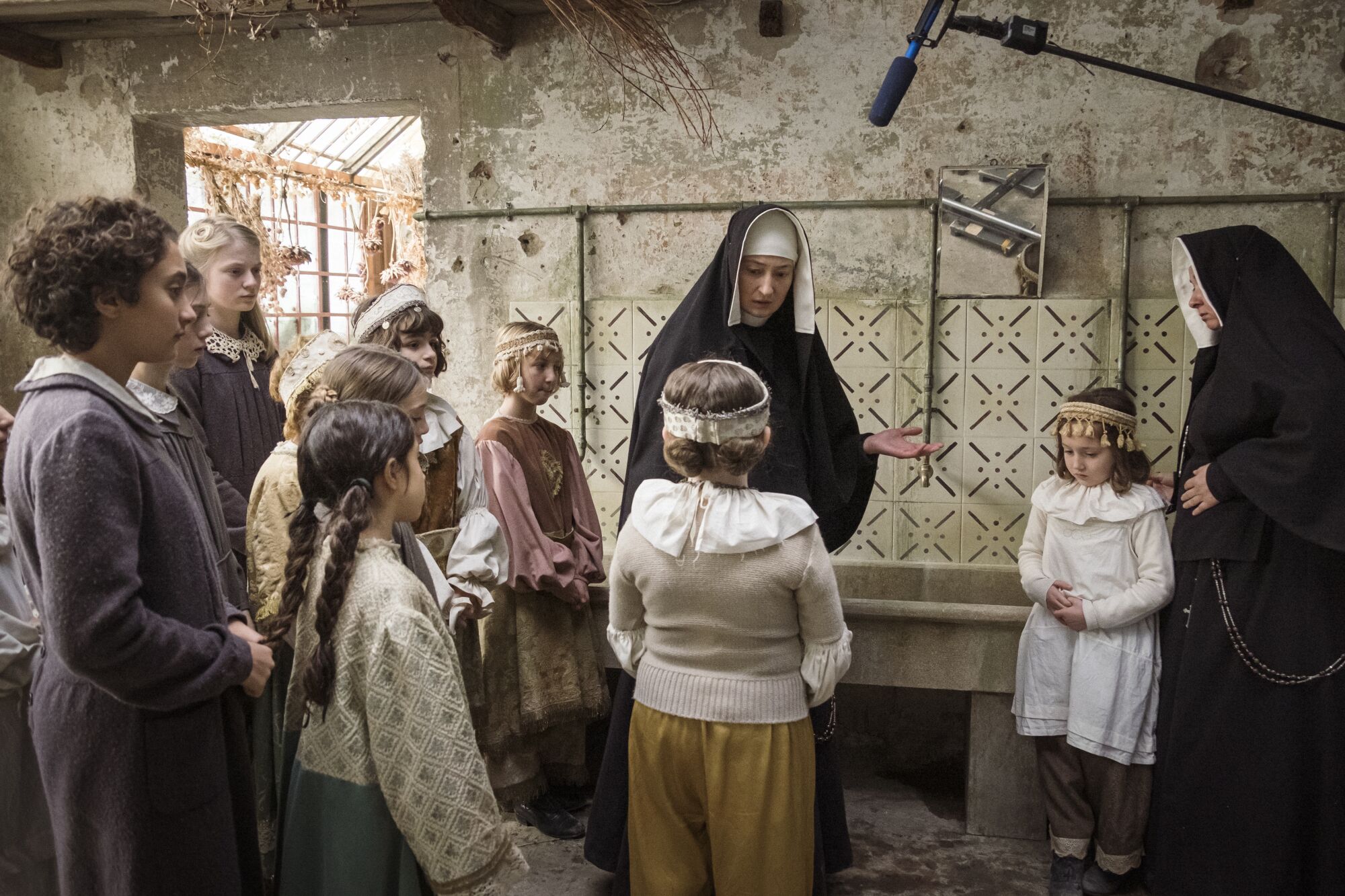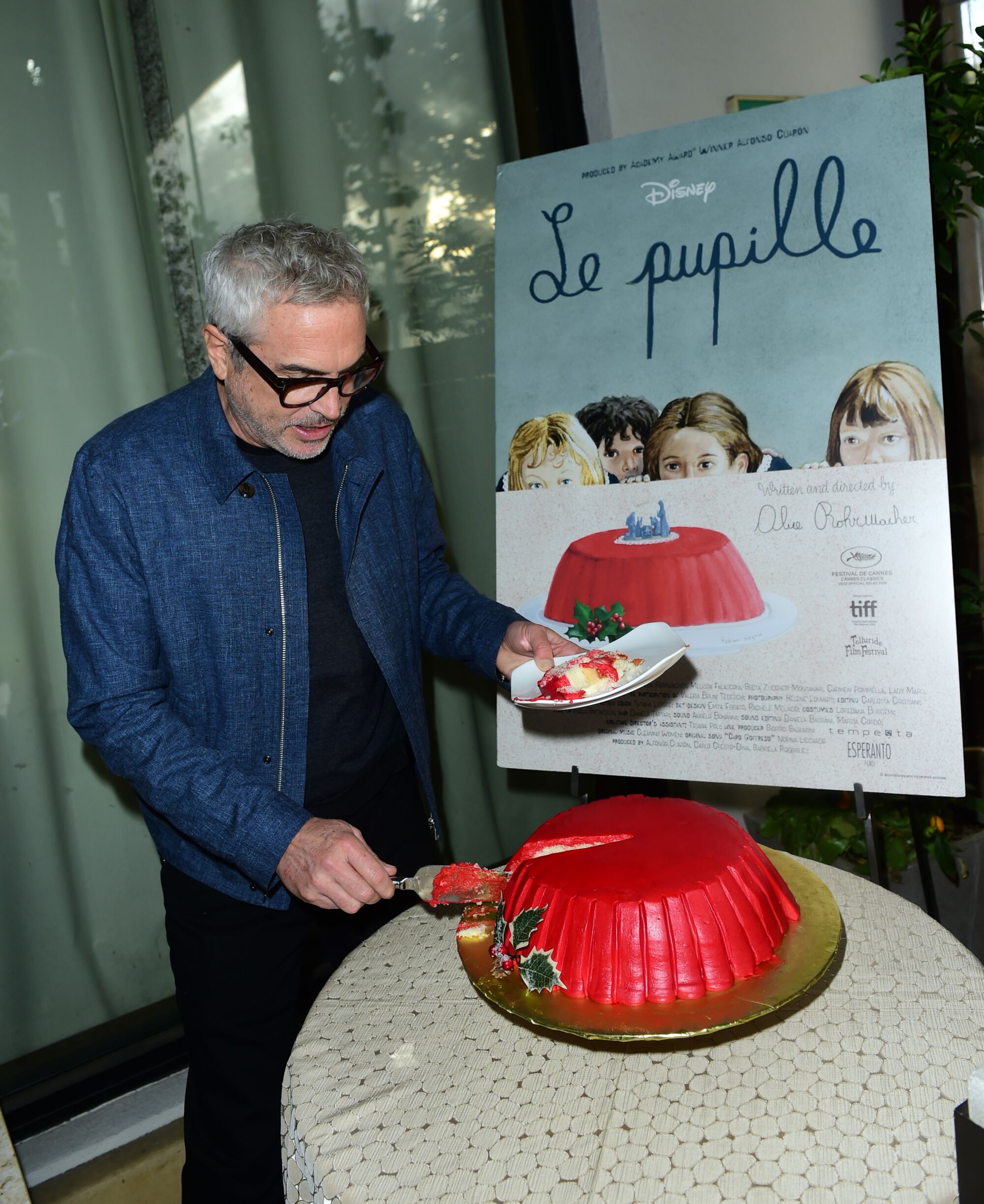The Mexican filmmaker Alfonso Cuarón isn’t exactly a stranger to the members of the Academy of Motion Picture Arts and Sciences.
Besides having won the Oscar twice as a director — the first for his work on “Gravity” (2013), the second for “Roma” five years later — he also has received the coveted award for his editing work on “Gravity” and for cinematography on “Roma,” which also won the Oscar for international feature.
But the film with which he has a serious chance of returning to the ceremony on March 12 lists him as a producer. “Le Pupille” (The Pupil), a 37-minute drama about Christmastime goings-on at a strict religious girls’ boarding school in the 1940s, is on the short list for live-action short film. The finalists will be announced Jan. 24.
“Le Pupille,” which started streaming on Disney+ in December, was written and directed by Alice Rohrwacher, the prominent Italian filmmaker who offered us the excellent 2018 feature film “Lazzaro Felice” (Happy as Lazzaro), a magical drama about an Italian peasant family, which can be seen on Netflix.
Although it takes place during Christmas season, “Le pupille” takes a particularly atypical and rebellious route in telling the story of an orphan who defies in her own way, and with great innocence, the strict rules imposed on her.
In the event that “Le Pupille” is nominated, Cuarón may well find himself standing alongside his Mexican compadres and compatriots Alejandro G. Iñárritu and Guillermo del Toro, who also have a good chance of ending up in the Oscar race for their work on “Bardo, False Chronicle of a Handful of Truths,” and “Pinocchio,” respectively.
In an interview with the Los Angeles Times en Español, Cuarón, who recently participated alongside Iñárritu and Del Toro in the “Three Amigos” event, held at the Academy Museum, spoke about the content of the short, his work with Rohrwacher and the striking similarities that “Le Pupille” shares with his compadres’ latest works.
Alfonso, how did you get involved with “Le Pupille”?
I had the idea to make a series of short films that celebrate the end-of-the-year holidays, from Christmas to Hanukkah, because it is a time when almost all cultures have a celebration that originates basically from the winter solstice.
The intention is for it to take place in different countries, in different languages and with different directors who represent these cultures. Despite the fact that each of the celebrations has very specific details, they are acts that unite us as human beings.
Doing something like this gives you the opportunity to work with directors you admire, and that immediately made me think of Alice Rohrwacher, one of the most relevant directors today, who has made not only “The Wonders” and “Happy as Lazarus” but also several short films, and who has also collaborated with [the French street artist and photographer] JR [in the short “Omelia Contadina”] and [with the fashion label] Prada.
I talked to her, I presented the project to her, and she told me that she would think about it. When that happens, you’re used to not getting a response for days, weeks or even months, but she contacted me the next day to tell me what she had come up with, based on a letter that [the emblematic Italian writer] Elsa Morante gave her.
That letter is the essence of what she ended up filming, and although I didn’t quite understand what she wanted to do at the time, I was sure that I was facing one of those filmmakers who have very clear ideas. After a few days she sent me a script, and we started preproduction.

A scene from the Disney+ film “Le Pupille.”
(Disney)
This is not a conventional Christmas story; I imagine that was also part of the concept, that you did not intend to offer a sweetened version of the celebration.
What I wanted is for this to be a version of Alice. I love that she has made a short in which she combines so many thematic elements and in which there is no easy answer. Ultimately, it is a story about rebellion, about disobedience, and in that sense, it is close to Guillermo [del Toro’s] “Pinocchio”; but it is also a story about how our actions have unintended consequences.
There is a lady here who asks the orphan girls to pray for her fiancé to return, and she repays [the favor] with a large cake that the mother superior intends to use in order to please the bishop. She manipulates the girls by resorting to moral blackmail, asking them to make the sacrifice of not eating the cake, and this girl’s rebellion in denying the request unleashes a series of incidents that lead to the cake being shared.
Did you intervene in the script or did you give certain parameters to the director?
When you work with someone like Alice, you want to be an observer, a fan. I am an admirer of her cinema, of her process, of how she builds her stories from moments and how she maintains a tone that has absolute purity, infinite generosity, while handling important themes. There is something in her work — and that includes this short film — of a fairy tale, but what is very beautiful is that, at the end of the story, the girls themselves say that this is a story without a moral.
You mentioned that the disobedience in “Le Pupille” is connected to that of Guillermo’s “Pinocchio,” and this probably has to do with the fact that you decide to work with artists who have a sensibility similar to yours and that of your dearest colleagues.
Yes, and Alice also has a great sense of realism in her characters, because she, like Guillermo, doesn’t try to evade the social context. What happens a lot when these stories are told in Hollywood is that the social and political issue is completely avoided, whereas in both “Pinocchio” and “Le Pupille” those elements are present.
Alice has a great sympathy with the working classes, a complicity that also implies giving them a voice, giving them a place. In that sense, she reminds me of filmmakers like the brothers [Vittorio and Paolo] Taviani or [Pier Paolo] Pasolini, who did the same thing while maintaining the difficult-to-achieve balance between that and fantasy.
What is the plan with the entire project? Do you have a specific deadline to meet it?
We are not setting a deadline. We already shot “The Shepherd,” directed by Iain Softley and based on a short novel by Frederick Forsyth, and we are developing another short film with David Lowery, who I also admire.
For now, I am very grateful to Disney and the support it has given us from the beginning. I think it’s the first time [that company] is behind a short film that isn’t in English and could be nominated for an Oscar. It’s been a very strange marriage between a filmmaker like Alice and Disney, but a very successful one at the same time.
Certainly. It doesn’t escape notice that a company that until recently was so conservative is making room for a proposal like this.
I think all the platforms are realizing that the world is much bigger than what Hollywood used to provide, not only in terms of the creative voices that exist around the world, but also in terms of the audience that exists around the world that wants to see their cultures reflected.
“Le Pupille” could give you the opportunity to be nominated for an Oscar at the same ceremony with Guillermo and Alejandro.
Yes, but it wouldn’t be the first time. In 2007, we were lucky to be nominated at the same time: Guillermo for “Pan’s Labyrinth,” Alejandro for “Babel” and me for “Children of Men.” And if I say “lucky” it is because being in that circuit gives us the opportunity to spend time together, which has become difficult because we do things in different places.
Of course, what makes me most happy is that all this is giving opportunities for dissemination to “Le Pupille,” a film that might not be suitable for very young children, but works wonderfully for older children and, definitely, for adults. She has a childlike point of view, but at the same time she manages a great thematic complexity and an enormous sense of beauty, because Alice is a poet who honors reality.

Cuarón with one of the essential narrative elements of the short film: a cake that becomes the focus of discord.
(Vivien Killilea/Getty Images for Disney)
Unlike what happened with the works that you promoted in 2007, “Le Pupille,” “Pinocchio” and “Bardo” are available on streaming platforms, and that is where they will essentially be seen. It has been quite a process for you guys.
It is not the first time that these paradigm shifts have occurred. At the end of the 1920s, with the advent of talkies, many filmmakers and actors spoke of the death of cinema. And it is true that, in the first years in which this occurred, commercial cinema suffered a setback, because it had reached an exquisite language and this was changed by a practically theatrical language, because everyone was concentrating on moving forward the dialogue, and the camera did not do much.
However, there were directors like [Alfred] Hitchcock, John Ford and [Yasujirō] Ozu who took that new language, made it their own and tremendously developed the possibilities of cinema. There were others who did not know how to make that transition and were relegated, even forgotten. But the cinema is not going to die. It will continue to transform, thanks to filmmakers who will adapt to the new conditions to make masterpieces.
Stay connected with us on social media platform for instant update click here to join our Twitter, & Facebook
We are now on Telegram. Click here to join our channel (@TechiUpdate) and stay updated with the latest Technology headlines.
For all the latest Hollywood News Click Here
